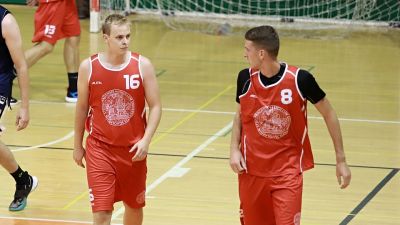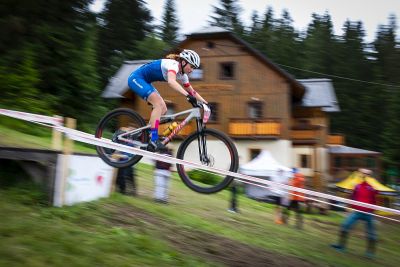Football is not just Messi and Ronaldo. Many exceptional players over the years emerged even from modest conditions in Czechia including Josef Masopust, Antonín Panenka, Petr Čech or Patrik Schick. Jan Kozel, a young football coach and graduate from CU's Faculty of Physical Education and Sport, says famous Czechs athletes, across the spectrum should be role models for up-and-coming talent today.
“We need to provide kids with historic examples, people like Pavel Nedvěd [European Footballer of the Year in 2003 – ed. note], [Davis Cup star] Radek Štěpánek, [Olympian] Emil Zátopek and others, who worked their way up through sheer diligence,” says Jan Kozel. The need to constantly work on oneself is something that he stresses at football club SK Benešov. And he uses the footballers of Slavia Prague and Viktoria Plzeň during the time of coach Pavel Vrba as more recent examples.
“We saw what players could do in European competition thanks to their training diligence. It was not a coincidence,” he points to those success as a model for all Czech clubs. “It's not so much what they do, but rather how they do it. It's their personal attitude, how they approach things. They train personalities and try to squeeze the best out of each player.”
Experience with Slavia and experience in England
Kozel know what he is talking about. As a youth, he came up through the Vršovice club’s system as an active player until he was 15 years old. His closest colleague as coach is Filip Houštecký, the son of the assistant head coach at Slavia. “We know each other from the days of youth football, when we faced each other on opposing teams. We’re the same age,” says Kozel.
The two began working together during last season, when Kozel returned from a stint in England and took over as coach of Viktoria Žižkov's reserve team. Before this season, they joined the youth team of SK Benešov, where Kozel is officially the head coach and Houštecký, assistant head. “I don’t adhere to a strict definition of our roles: above all, we work as a duo and I am happy that we are on the same path, we complement each other, we have similar ideas,” he explains.
Kozel argues that Czechs need to forge their own path when it comes to football, rather than constantly comparing themselves to the Spanish or English. “Not everything is rosy in England either. Most fans see mainly rich clubs, but English football is not just Chelsea, Liverpool or Manchester City... There are many clubs that have more money than Czech clubs, but they also have problems. What really makes a difference is the system and the people themselves,” Kozel says.
“In England, football is an integral part of family life. On match day, you often see dads - but also mums - with their children dressed in their team's colours, walking around the shopping malls, then going to the park for a few more minutes and then heading to the match in the afternoon... It's a holiday for them. And when you do football professionally, you either do it with love or you don't get higher in the club. That's the way the system is set up,” the young coach reveals.
Altogether, Kozel spent more than two years in England as a student, footballer and football official. “It gave me a lot of experience and a lot of job opportunities. I met a lot of people there who influenced my life,” Kozel recalls.
He decided to pass on his experience in Czech football: “I enjoy the opportunity to inspire young boys to become not only good footballers but also good people. The goal of youth coaches should be that after each season a player moves on to a higher category. It's not just about whether they finish fifth or eighth with the club, but to push the players individually.”
And to set up a certain system of education is necessary even with the youngest players, according to the CU graduate. "By the age of thirteen, when they are still being guided by their dads or mums, they should be doing football with love, the coaches should inspire enthusiasm and passion in them. Then, as they get older, the demands should increase, not the other way around," he muses.
“Children are often put under unnecessary pressure and don't enjoy football spontaneously as they should. And by the time they're 15, they may be so overwhelmed by the pressure that they quit the sport. It's one thing to be motivated to go to football and another to be committed and go to football,” Kozel stresses.
Kids need role models
“If you look at Sweden, Canada, Germany, England... there the kids are brought up in a complete way. The coaches who guide them tend to guide them to what they would like from them. The kids are then more engaged and responsible for their own performance and activities. In our country, we are often told – ‘you are doing this wrong, don’t do it like that’ - but few people explain why the child is doing it wrong and how to do it differently. Children need good examples, they need to think about football and their actions through a certain system. And they also need to enjoy it,” he adds.
| Jan Kozel |
| Jan Kozel graduated from the Faculty of Physical Education and Sport at Charles University in Prague and Solent University in Southampton, where he studied coaching - specialising in football. As a youth, he played for Slavia Prague, and as an adult was a defender for Dukla Prague and Aritma Prague. He also played several matches in lower competitions in England. He started coaching during his playing career at Aritma and has also tried coaching positions in the academies of English clubs Preston North End FC and Portsmouth FC. In 2020, he was the head coach of the reserve team of Viktoria Žižkov FK; since this summer he has been the head coach of the youth team at SK Benešov and GTM FAČR in the Central Bohemia Region. He holds a UEFA A licence, which is the second highest football coaching qualification in Europe. |
























